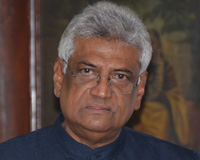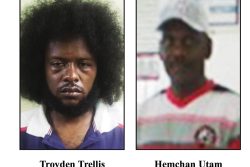The Guyana Elections Commission (Gecom) last night released results for 78% of polling stations, showing the incumbent PPP/C and the opposition alliance APNU+AFC neck and neck but angering the opposition alliance as many of the uncounted stations represented its stronghold.
APNU+AFC after meeting with Gecom yesterday afternoon was convinced that the promised declaration of 94% of the results last night would show an unassailable lead over the PPP/C from Monday’s general elections. It however heard results for only 1,809 stations, with many of the remaining 490 stations from Region Four and which stations had been identified by the PPP/C for recounts.
Gecom’s actions were last night strongly condemned by the leaders of APNU and the AFC, David Granger and Khemraj Ramjattan. (See other story on page three.)

Amidst growing calls for a declaration, Gecom announced that APNU+AFC amassed 157,367 votes to the PPP/C’s 157,304 votes, based on a count from 1,809 of the 2,299 polling stations across the country. Of the 490 polling stations still to be counted, 276 are from Region 4, which has been traditionally won by the opposition at previous elections.
Although the tally given represented results from just over 78% of all polling stations, Gecom was subsequently accused of selectively releasing results to give the impression of a close race and the opposition alliance accused it of being “reckless” and “provocative.”
With the PPP/C calling for partial recounts in all ten administrative regions, Chief Election Officer (CEO) Keith Lowenfield last evening told a media briefing that it was for this reason that Gecom had set aside the 490 Statements of Poll (SoPs) under query and gone ahead and processed the results from the 1,809 polling stations.
Although it has been accused of using the recounts as a delaying tactic, the PPP/C has said it has enough evidence of “skullduggery” to substantiate its requests, notwithstanding the fact that all the international observers have expressed confidence in the tabulation process.
While recounts had begun in three regions based on the PPP/C’s initial requests-regions 1, 2 and 8—the process had not started in any of the additional regions. Lowenfield said by this morning the commission would be ready to release the preliminary results of all the SoPs received from the 2,299 polling stations.
However, he could not say when the commission would be able to declare the winner and announce the next president of the country. Observers have said that with the PPP/C’s requests for recounts, this may not happen until Saturday.
Sources told this newspaper last evening that the country would have seen a turnout for Monday’s poll at between 60% and 70% of the 570,708 registered voters. The vote count presented by Gecom reflected 55.4% of the voters’ list, which is believed to be swollen with entries for migrants and the deceased.
While acknowledging last evening that the country is anxious for results, Gecom Chairman Dr Steve Surujbally said that the commission must be accurate. “At the end of the day, we have results to give to the nation. This nation is right now on tenterhooks, there might even be growing tension. Overriding everything, however, is the accuracy… of the final statements,” he said.
‘No official results’
Earlier, Dr Surujbally had confirmed the PPP/C had initially requested partial recounts of ballots in the three regions—re-counts of 16 polling stations out of a total of 95 in Region One; 98 out of the total 138 in Region Two; and 8 out of the total 49 in Region 8. However, yesterday morning the PPP/C requested the recounts of results from ballot boxes of 276 polling stations out of 891 in Region 4. Subsequently, Surujbally said he was “reliably informed” that the party wanted partial recounts in all electoral districts.
“There are those who believe that they are not allowed to do that… if there is no declaration from the returning officer, then you can’t challenge. But there are others who say reading the law correctly that is possible,” he said.
Up to last evening, the commission had not definitively said what advice it eventually heeded but did indicate that recounts had started in the initial three regions requested by the PPP/C.
Ahead of last evening’s announcement, Surujbally had said that the commission had gone through all the SoPs with a “fine teeth comb” and that it feels safe with what it had. “If you would like to then make your own calculations and your own decisions that would be up to you. The citizenry, everybody, would have that information but there is a challenge going on, there is a recount going on and therefore the figures could not possibly be valid in terms of me giving an official final results,” he had said when referring to the figures the commission was expected to release last evening.
He noted that he was advised if he “jumped the gun” and said the results were official, then it would provide an opening for an injunction to be sought.
“Where we are going right now is that when the returning officer has made the public declaration, one has the opportunity to challenge by noon of the following day… Others are saying, you know, putting the statement of polls on the wall outside that in itself is a declaration and one could start challenging from that because it is a legal declaration from the unit stationed at the polling station,” he added.
Explaining the recounting process, Surujbally said that all of those who were on site at the polling station in dispute on elections day would be present and the ballot box would be returned and they would go through the contested SoPs.
He said that the concerns raised by the PPP/C were sent via letters to the various agents in the respective districts and were in the possession of the CEO, who had indicated to him that one of the bases for the requests was the number of rejected ballots.
‘Confident’
Meanwhile, at yesterday morning’s press conference US Embassy Chargé d’Affaires Bryan Hunt, while urging patience, said that the electoral process had been a very credible one and he added that they are very confident in the process Gecom has been using in the tabulation of the votes. “We are confident that when those results are released, they would fairly reflect how people voted on the day,” he said.
Hunt said the PPP/C had not raised any issues with him regarding the tabulation process and noted that both main political campaigns had raised concerns at various polling stations and the international observers went to verify whether there was any basis for the concerns. “What we found, repeatedly from all sides, was a clean, fair and free process. We saw nothing that was going to materially impact the outcome of the votes,” he said.
Also asked if the PPP/C has made any specific complaints about the polls, Canadian High Commissioner Dr Nicole Giles said there has been a “variety of conversations over the last couple of days” and that the international coordinating team worked very closely with others to “look into claims that have been made on all sides and investigations demonstrated that we found no significant issues with the process and certainly no anomalies that would have had a material impact on the results.”
The British High Commissioner Greg Quinn added that it is not just the three main western missions that have seen this but all of the international observers that were present “have said the same about the process being free and fair and where there were problems they were not material.”









